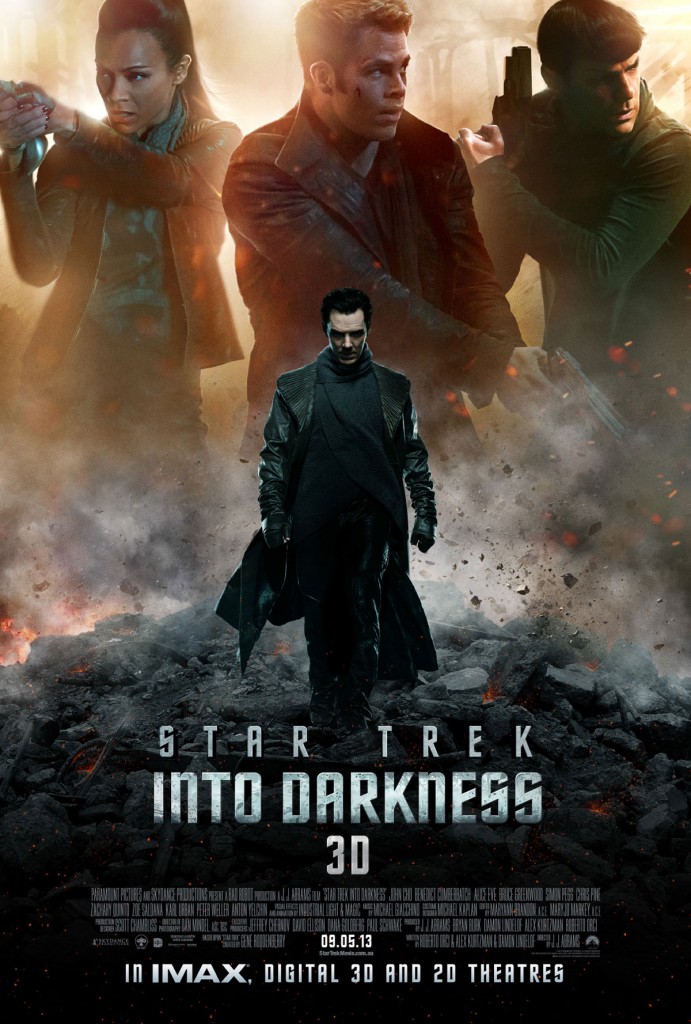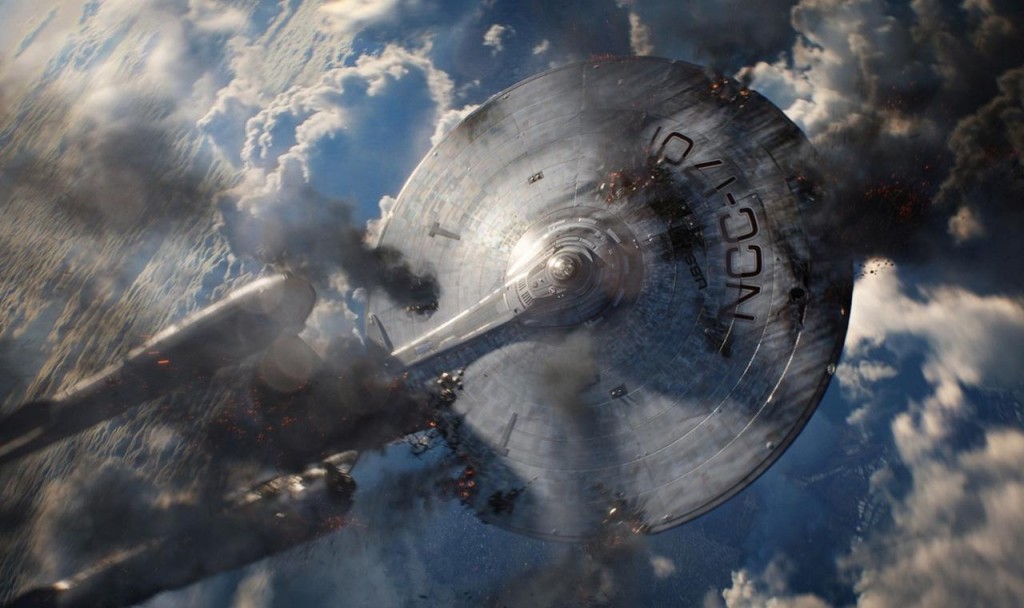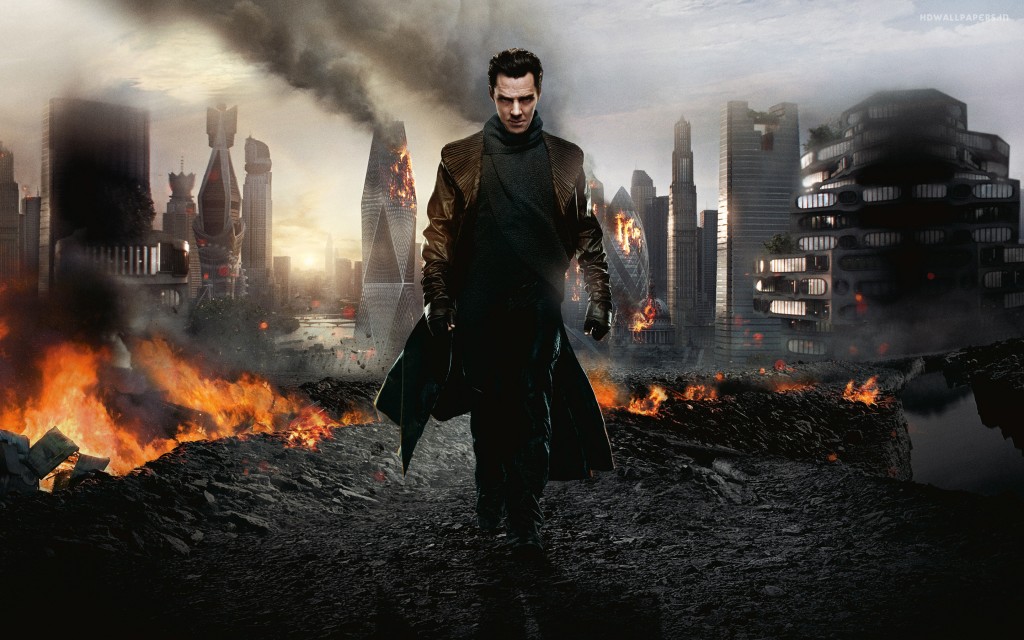 Star Trek: Into Darkness came out this weekend, and as a result reviews have been varied. By and large they seem to be very positive, not only from moviegoers, but also from critics, although there have been some reviews that have been very negative. Unfortunately, with this post I must contribute to the latter category of responses. For those interested in a couple of good critical essays I’d suggest Matt Goldberg’s at Collider.com, J. Bryan Lowder at Slate, and Sujay Kumar at The Daily Beast.
Star Trek: Into Darkness came out this weekend, and as a result reviews have been varied. By and large they seem to be very positive, not only from moviegoers, but also from critics, although there have been some reviews that have been very negative. Unfortunately, with this post I must contribute to the latter category of responses. For those interested in a couple of good critical essays I’d suggest Matt Goldberg’s at Collider.com, J. Bryan Lowder at Slate, and Sujay Kumar at The Daily Beast.
A few preliminary thoughts are in order. I am a nearly lifelong Star Trek fan, having first encountered the series as a child in the early 1970s. I have continued to follow the franchise through its various incarnations over the years, from the initial films based upon the first series, to the later television expressions. So I have a great familiarity with the brand. I addition, I am not a Star Trek “purist,” idealist or original series “loyalist.” Along they way the various installments have been of varying quality, as one would expect from any creative work that has involved many different people building on and adapting original concepts over the course of many years in a changing culture. While I have my preferences in which expressions are better than others, I do not believe that the original series is the only “true” and correct version. So while readers may disagree with the thoughts that follow, they cannot do so by way of the casual dismissal of an original series idealism.Readers should also be aware that previously I have been critical of Abrams’ work in the first Star Trek film, and some of my criticisms of that film also carry over into my concerns over Star Trek: Into Darkness.
I acknowledge at the outset that this film does include a lot of spectacle. Viewers will get their money’s worth in terms of action and special effects. For these reasons Star Trek: Into Darkness is being touted in advertising as the first major blockbuster of the summer. But surely we’ve seen these elements already, with an entertaining story, in Iron Man 3. Perhaps it’s a matter of defining when summer starts for such accolades. But in my view, there is far more to a good science fiction film, and especially one that is part of the legacy of Star Trek. Science fiction as a genre at its best, not only includes visual splendor, but also takes advantage of its ability to present an alternative universe where the reader or viewer has their assumptions challenged.
 Science fiction is able to do this through its inclusion of a facet that has been labeled “cognitive estrangement.” This has been defined in The Science Fiction Handbook as an element “that places readers [or viewers] in a world different than our own in ways that stimulate thought about the nature of those differences, causing us to view our own world from a fresh perspective.” This takes place to a certain extent in all genres, but science fiction is distinguished in that “cognitive estrangement is not only present but dominant.” This feature means that science fiction stretches us. Sense of Wonder: A Century of Science Fiction touches on this and says that “what science fiction offers many readers are new options for thinking through the concerns of their own age, metaphors which help to provide distance, and opportunities to redefine their own perceptions.” This feature gives science fiction a unique ability to address controversial topics like racism, war, and religion. It has done so many times, and Star Trek has been a good example of this, with the original television series tackling all of these topics and more.
Science fiction is able to do this through its inclusion of a facet that has been labeled “cognitive estrangement.” This has been defined in The Science Fiction Handbook as an element “that places readers [or viewers] in a world different than our own in ways that stimulate thought about the nature of those differences, causing us to view our own world from a fresh perspective.” This takes place to a certain extent in all genres, but science fiction is distinguished in that “cognitive estrangement is not only present but dominant.” This feature means that science fiction stretches us. Sense of Wonder: A Century of Science Fiction touches on this and says that “what science fiction offers many readers are new options for thinking through the concerns of their own age, metaphors which help to provide distance, and opportunities to redefine their own perceptions.” This feature gives science fiction a unique ability to address controversial topics like racism, war, and religion. It has done so many times, and Star Trek has been a good example of this, with the original television series tackling all of these topics and more.
Star Trek: Into Darkness incorporates contemporary real-world issues, and does so by way of demonstrating its post-9/11 context, by way of its depiction of terrorism, and the related issues of vengeance and retributive violence. The Federation is the focus of a terrorist attack from an “old” foe, Khan from the original series and the film Star Trek II: The Wrath of Khan. (But in Abrams’ alternative Trek universe this is a new enemy, right?) Kirk, who in Abrams’ universe has become largely a caricature rather than the character of the original series, wants revenge, and rushes off to exact it in ways that echo the “War on Terror” and the attacks on Iraq and Afghanistan, as well as continued US foreign policy on drone strikes that kill not only terror suspects but also significant numbers of innocent civilians in collateral damage.
Two aspects of this narrative are noteworthy in my critique. First, this film shows an increasingly militarized Federation. True, this is called into question, as when Scotty says, ““A military organization? Is that what we are now?”But for my money Abrams doesn’t take sufficient advantage of cognitive estrangement in order to press the issue sufficiently. Any serious concerns such as this quickly give way to explosions and special effects. Some may question why this is an issue for me in light of Star Trek‘s long history of the military action. I stated above that I do not have an idealist view of Star Trek, so I am aware of the fact that while the original series incorporated the Prime Directive and the rights of alien species to self-determination, and much talk of diplomacy and peacemaking, nevertheless, the Enterprise spent a lot of time acting like a military vessel and made frequent use of its weaponry in the process. This reflects Gene Roddenberry’s humanistic utopian vision for humanity, but also the pressing realities of the Cold War and Vietnam as the cultural context out of which the original series was birthed. Star Trek: Into Darkness seems to signal, not a change in mission, but an increasing acceptance of the militaristic element of the Federation.
 Second, this film’s portrayal of elements that parallel our ongoing post-9/11 raises important issues, but as with a militarized Federation, it does so without any real critical engagement that good science fiction is known for. The film raises issues, but seems afraid of seriously engaging them. If Abrams wants us to wrestle with questions of national identity that play out as a result of our actions related to terrorism around the world, he certainly hasn’t done so in keeping with good science fiction, or the tradition of Star Trek. Consider the original series episode “A Private Little War.” There Kirk and the Enterprise crew wrestle with an escalating arms race between the warring tribe the Federation supports in order to hopefully defeat the tribe they oppose that is being armed by the Klingons. This episode provides commentary on the Vietnam War raging at the time, and the informed viewer had little doubt wondering where the story came down on the subject. Not so, in my view, in Star Trek: Into Darkness. I would like to have seen more soul-searching on the part of the main characters as to the moral challenges facing them and the Federation.
Second, this film’s portrayal of elements that parallel our ongoing post-9/11 raises important issues, but as with a militarized Federation, it does so without any real critical engagement that good science fiction is known for. The film raises issues, but seems afraid of seriously engaging them. If Abrams wants us to wrestle with questions of national identity that play out as a result of our actions related to terrorism around the world, he certainly hasn’t done so in keeping with good science fiction, or the tradition of Star Trek. Consider the original series episode “A Private Little War.” There Kirk and the Enterprise crew wrestle with an escalating arms race between the warring tribe the Federation supports in order to hopefully defeat the tribe they oppose that is being armed by the Klingons. This episode provides commentary on the Vietnam War raging at the time, and the informed viewer had little doubt wondering where the story came down on the subject. Not so, in my view, in Star Trek: Into Darkness. I would like to have seen more soul-searching on the part of the main characters as to the moral challenges facing them and the Federation.
This then raises questions about why Abrams would miss out on such an important opportunity. Aside from the fact that action and special effects probably provides more of an opportunity for box office success than critical reflection via science fiction, other possibilities present themselves. Previously Abrams has said that Star Wars never seemed like science fiction to him. Of course, it shouldn’t, because it was space opera or space fantasy, not science fiction. Such public assessments do not build confidence that this go-to director knows what genre he’s working in, and its potential. In addition, Abrams also drew the ire of Star Trek fans when he admitted he was not a fan of the franchise. This not only makes one wonder how familiar he is with it, and its extensive mythos that he has taken such liberties with in the construction of his alternative universe, but also whether understands and appreciates how Star Trek was able to draw upon cognitive estrangement in order to address social and cultural issues of the day.
In light of these considerations I am surprised that usually astute observers such as science fiction writer Robert J. Sawyer, who strongly criticized George Lucas for setting back serious science fiction, have been so glowing in their appreciation for Star Trek: Into Darkness. I hate to throw water on the latest installments in one of my favorite science fiction franchises, but in this reviewer’s opinion, this film and Abram’s reboot fall short of Trek’s legacy and truly reflective science fiction.





Thanks for your review. I was so pleased that Abrams bothered to include an ending, I enjoyed the film more than any of his other work.
However, Abrams typically opens doors that he either forgets or doesn’t know how to close and usually they include a religious theme. Like the beginning. There was a great opportunity to explore the nature of God, or god-likeness in the megalomaniacal Kirk and Kahn. The natives who switched from the God they knew to the god who saved them set up a interesting and profound thread that could have been explored over the next two hours, but it fell of the story map. It reminded me of LOST.
I don’t think that sci if needs to have religious themes, but if they are there, use them.
At any rate, my two cents. Thanks.
Ps: I’m the friend of Valerie’s who dared her to submit her Buffy piece. Looking fwd to the new publication.
Chris, thanks for sharing your comments. I’m glad you enjoyed the film.